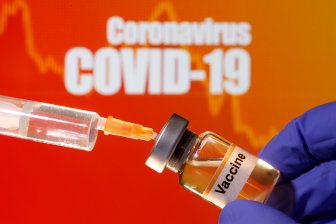A trial of a U.K.-developed coronavirus vaccine has found that it is safe and induces an immune reaction, according to preliminary results.

The research, published in the Lancet medical journal on Monday, shows that a Phase 1/2 trial of more than 1,000 healthy adults found that the vaccine induced strong immune responses up to Day 56 of the ongoing trial.
The vaccine is called AZD1222 and is being jointly developed by drug manufacturer AstraZeneca and scientists at the University of Oxford.
While people who received the vaccine did experience more side effects than those in the control group, who took a meningitis vaccine instead, there were no serious side effects reported. Fatigue and headache were the most frequently reported reactions.

The vaccine candidate is already in large-scale Phase 3 human trials to assess whether it can protect against COVID-19. The results released Monday only reflect the very earliest phase of clinical trials to assess basic safety and efficacy.
“We are seeing good immune response in almost everybody,” said Dr. Adrian Hill, director of the Jenner Institute at Oxford University, which conducted the research. “What this vaccine does particularly well is trigger both arms of the immune system,” he said.
Hill said that neutralizing antibodies are produced — molecules that are key to blocking infection. In addition, the vaccine also causes a reaction in the body’s T-cells, which help to fight off the coronavirus.
He said that larger trials evaluating the vaccine’s effectiveness, involving about 10,000 people in the U.K. as well as participants in South Africa and Brazil, are still underway. Another big trial is slated to start in the U.S. soon, aiming to enrol about 30,000 people.
How quickly scientists are able to determine the vaccine’s effectiveness will depend largely on how much more transmission there is, but Hill estimated they might have sufficient data by the end of the year to decide if the vaccine should be adopted for mass vaccination campaigns.

He said the vaccine seemed to produce a comparable level of antibodies to those produced by people who had recovered from a COVID-19 infection and hoped that the T-cell response would provide extra protection.

Get weekly health news
“There’s increasing evidence that having a T-cell response as well as antibodies could be very important in controlling COVID-19,” Hill said. He suggested the immune response might be boosted after a second dose; the trial tested two doses administered about four weeks apart.
This vaccine is derived from an adenovirus, which causes an illness in chimpanzees that resembles the common cold. The scientists weakened this virus and genetically modified it to include a protein from the SARS-CoV-2 virus in order to make their vaccine.
The researchers noted that their vaccine needed to be tested on other populations, particularly older adults, to determine whether it remained safe and effective for everyone.
At a press conference, Dr. Mike Ryan, director of the WHO emergencies program, congratulated the Oxford research team for their work, though he cautioned that, “There is a long way to go,” before there is an effective vaccine for coronavirus.
“We need to move into larger-scale real world trials,” he said.

Study co-author professor Sarah Gilbert of the University of Oxford said in a press release, “There is still much work to be done before we can confirm if our vaccine will help manage the COVID-19 pandemic, but these early results hold promise.”
There are around 150 coronavirus vaccine candidates in development around the world right now, said Chil-Yong Kang, a virologist and professor of virology at Western University. It’s likely that more than one formulation will work, he thinks.
“There will certainly be more than one vaccine to prevent the COVID-19 pandemic,” he said. “And who is going to make the most effective, safest vaccine remains to be seen.”
The trick, he said, is making sure that enough people around the world are able to get it. He estimates that around 1 billion people would need to be vaccinated in order for enough people to be immune and for new outbreaks to decrease.
For a vaccine to be successful, it has to fulfill three criteria, he said.
“Number one, it has to be safe. Second, it has to be effective in preventing the disease or a virus infection. Then thirdly, the system must be able to produce the millions and millions of doses of vaccines without any problem.
Initially, we might want to concentrate on vaccinating countries with massive outbreaks, like the U.S., Brazil and India, to curtail the spread of the disease, but he thinks that eventually it must be widely available.
AstraZeneca has signed agreements with governments around the world to supply the vaccine should it prove effective and gain regulatory approval. The company has said it will not seek to profit from the vaccine during the pandemic.
Another vaccine trial in China of a different formulation also reported favourable results in the Lancet on Monday. This vaccine, jointly developed by CanSino Biologics and China’s military research unit, has also been shown to be safe and induced immune response in most participants.
It hasn’t yet moved into large-scale clinical trials, but it has received the green light to be used in China’s military.
The results from the mid-stage study support the testing of the vaccine candidate in a large trial, the study authors said.
Last week, American researchers announced that the first COVID-19 vaccine tested there boosted people’s immune systems just as scientists had hoped and the shots will now enter the final phase of testing. That vaccine, developed by the National Institutes of Health and Moderna, produced the molecules key to blocking infection in volunteers who got it, at levels comparable to people who survived a COVID-19 infection.
Nearly two dozen potential vaccines are in various stages of human testing worldwide, with a handful entering necessary late-stage testing to prove effectiveness.
— with files from the Associated Press and Reuters




Comments